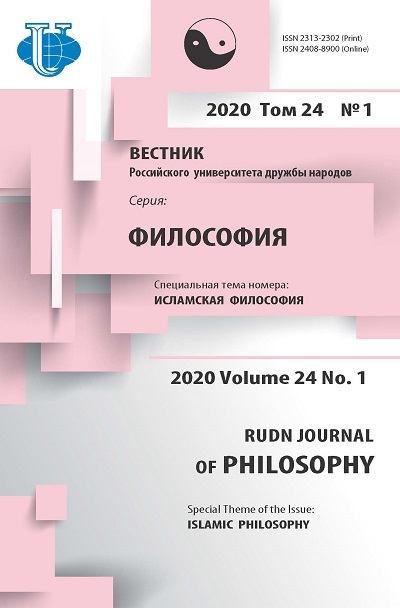The problem of understanding and interpretation of African philosophy
- Authors: Chukwujekwu E.S.1
-
Affiliations:
- RUDN University
- Issue: Vol 24, No 1 (2020): ISLAMIC PHILOSOPHY
- Pages: 134-142
- Section: SCIENTIFIC REVIEWS
- URL: https://journals.rudn.ru/philosophy/article/view/23098
- DOI: https://doi.org/10.22363/2313-2302-2020-24-1-134-142
- ID: 23098
Cite item
Full Text
Abstract
This article is devoted to the problem of interpretation and understanding of African philosophy as a phenomenon of intercultural communication. It is a question of the presence of stereotypes in perception and assessments of African philosophy: from the assertion of its interiority and non-philosophical character to the propaganda of its primacy in the whole of world philosophy as the theorized core of spiritual life. The author also indentified the significant obstacle in the study of African philosophy and understanding of its status in the history of world philosophy. Also the article touched the importance of African revival, and the key factors to its revival, the idea of Afrocentrism was also been mentioned as the key solution for the African revival. In this work, ethnophilosophy is further considered as the source of the whole philosophy of Africa. Attention is also paid to the problem of misunderstanding and misinterpretation of African philosophy and culture in the framework of world or universal philosophy and science. Also in the article, issue of searching for African identity is being raised, the ideas and impacts of some African thinkers, also socio-political concepts such as Pan-Africanism, Negritude, African socialism, African humanism, Afrocentrism and others, which had a serious impact on African socio-political life were also identified. The diversity of ethnic cultures, and its roles in the black continent were mentioned, and as well, emphasis on ethical issues, religions representations and superstitions.
Keywords
About the authors
Ejike Sam-Festus Chukwujekwu
RUDN University
Email: chukvudzhekvu-es@rudn.ru
postgraduate student Miklukho-Maklaya Str., 6, Moscow, Russian Federation, 117198
References
- Bell RH. Understanding African Philosophy. N.Y., London: Routledge, 2002. P. 204
- Nkrumah K. Consciencism: Philosophy and Ideology for De-Colonization. 1964. P. 68.
- More MP. African Renaissance: the politics of return. African Journal of Political Science. 2002;7(2):65-80.
- Xinhua News Agency. “France: Creditors Should Do More for Africa's Debt Problem.” Paris, March 27, 1988. Item no. 0327019.
- Hitchens Ch. “Africa without Pity.” Vanity Fair. (November 1994): 43-52.
- Johnson P. “Colonialism's Back - and Not a Moment Too Soon.” New York Times Magazine (April 18, 1993): 22.
- Kaplan R. “The Coming Anarchy.” Atlantic Monthly (February 1994): 44-76.
- More MP. African Renaissance: the politics of return. African Journal of Political Science. 2002;7(2):65-80.
- Nyerere JK. Ujamaa: Essays on Socialism. N.Y.: Oxford University Press; 1968;
- Nyerere JK. Ujamaa: The basis of African Socialism. Oxford University Press, 1968
- Bruce BJ. Philosophy in an African Place. Lexington Books; 2009.
- Senghor LS. On African Socialism. N.Y.: Praeger, 1964. P. 94, 72.
- Mikhalina OA. African philosophy of education in search of meaning. RUDN Journal of Philosophy. 2010;(3):39-46.
- Mudimbe VY. The Invention of Africa: Gnosis, philosophy a. the order of knowledge. Indiana univ. press; 1988. XII.
- Mudimbe VY. The idea of Africa. Indiana polls: Indiana univ. press; L.: Currey, 1994. XIX. 235 p.
- Chistyakova OV. Philosophical-religious Legacy as the Basis for the National Identity and Humanitarian Education of Modern Russia. Proceedings of the 2nd International Conference on Culture, Education and Economic Development of Modern Society (ICCESE 2018). Advances in Social Science, Education and Humanities Research. Moscow, Russia, March 01-03, 2018. Paris, Atlantis Press, 2018. P. 1279-1283.
Supplementary files















